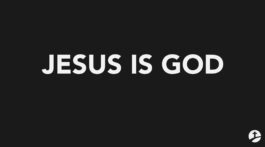This course will study presuppositional apologetics to be a better witness for Jesus Christ. The textbook used will bring to light the presuppositional method with its most important parts. The student will learn how to know what they believe as a Christian is true and how to show the faulty assumptions of those without a biblical worldview.
The goals of the class are; (1) The student will be able to demonstrate understanding of the presuppostional apologetic approach, (2) The student will master a basic understanding of confronting non-biblical worldviews, (3) The student will begin the process of integrating the presuppostional approach in their ministry to unbelievers and (4) The student will be able to integrate multiple biblical texts into the presuppositional approach.
Click here for today’s notes in pdf.
I. Review of the Syllabus
Click here to download.
II. Understanding Presuppositional Apologetics
1. Apologetics: The defense of the faith.
- Other robust definitions:
- Apologetics has been defined as “that branch of Christian theology which seeks to provide a rational justification for the truth claims of the Christian faith.”
- “Developing one’s authentic self so as to present one’s faith as helpfully as possible to one’s neighbor.”
- The demonstration “that Christianity is reasonable and thus (a) to assure Christians that their faith is not idiotic and (b) to clear away the obstacles and objections that keep nonbelievers from considering the arguments and evidence for the truth of Christianity.”
- “The discipline that deals with a rational defense of Christian faith.”
- “The task of defending and commending the truthfulness of the gospel of Jesus Christ in a Christ like, context-sensitive and audience-specific manner.”
- “The business of engaging the worldviews of the day intelligently and thus bearing witness to Christ with credibility.”
- “The discipline that teaches Christians how to give a reason for their hope.”
- “Apologetics is also application of Scripture to unbelief.” (Loc. 764).
- 1 Peter 3:15-16 (NIV), “15 But in your hearts revere Christ as Lord. Always be prepared to give an answer (apologia) to everyone who asks you to give the reason for the hope that you have. But do this with gentleness and respect, 16 keeping a clear conscience, so that those who speak maliciously against your good behavior in Christ may be ashamed of their slander.”
2. Presuppositional Apologetics: A “basic heart-commitment.”
- For the Christian, that commitment is to God as revealed in his Word. While we maintain our ultimate commitment, we cannot accept as true or right anything that conflicts with that commitment. (p. 9, Loc. 1056).
- If we adopt the Word of God as our ultimate commitment, our ultimate standard, our ultimate criterion of truth and falsity, God’s Word then becomes our “presupposition.” That is to say, since we use it to evaluate all other beliefs, we must regard it as more certain than any other beliefs. (p. 3, Loc. 963).
3. Misunderstandings of Presuppositional Apologetics: By both Christian and Non-Christian.
- First, it engages in question-begging—assuming what one wants to prove (Loc. 800).
- Example of the “Begging the Question Fallacy” (Circular Reasoning), “A is true because A is true.”
- Typical deductive arguments are as follows:
- Premise 1: All men are mortal
- Premise 2: Socrates is a man.
- Conclusion: Therefore, Socrates is mortal.
- However, we hold it to be true that circular reasoning is the only reasoning that is possible to finite man. (p. 257, Loc. 6160).
- For example, the scientist argues in a circle when they use science to prove science or when someone uses reason to prove reason.
- However, circularity “in a system is properly justified only at one point: in an argument for the ultimate criterion of the system.” (p. 258, Loc. 6189).
- For example the Christian is sound in saying:
- Premise 1: Whatever God says is true.
- Premise 2: God said He is truth.
- Conclusion: Therefore, it is true God is truth.
- Over the alternative of the non-theist:
- Premise 1: Whatever reason says is true.
- Premise 2: Reason said it was true.
- Conclusion: Therefore, it is true reason is true.
- Second, is takes faith, “fideism.”
- All positions take faith; such as “faith that the universe exists and we’re not in the Matrix,” “faith to believe that you exist and are not a character in someone’s dream,” “faith to believe that other minds exists and that you’re not the only real person in existence, i.e., “solipsism,” “faith to believe that everything will exist tomorrow or in the second as it does right now and that it will not all vanish, i.e., “laws of nature and conformity.”
- Cornelius Van Til said, “The Christian’s position is not merely just as good as the non-Christian’s position. Christianity is the only position that does not per se take away the very foundation for intelligible scientific and philosophical procedure. Christianity is the only rational faith!” (p. 263, Loc. 6309).
- Therefore, Christians have the best reasons to believe and trust in what they do. We have “reasonable faith,” because it is based on God and His Word.
III. Thoughts from the Foreword
- Being a Disciple: The Bible has instructions and insights that affect every area of life, including apologetics. Our conduct is not the basis for our salvation, but is influenced by our salvation. (Loc. 328).
- A Christian believer is not supposed to just lie still, relax, and enjoy the salvation already given to him. He is to be active in serving the Lord, like an athlete or a farmer working hard (1 Cor. 9:24–26; 2 Tim. 2:5–6). Jesus says, “If you love me, you will keep my commandments” (John 14:15). (Loc. 334).
- A true disciple is never “off duty.” He is always a disciple. He is a disciple in the actions of his body, and a disciple also in the actions of his mind—a renewed mind. Consequently, he is a disciple in every word that he utters in an apologetic discussion. (Loc. 343).
- Being a Disciple in Apologetics: So discipleship has implications for apologetics. If Sue is a Christian believer, she must remain a believer and act like a believer when she is in discussions with non-Christians. She cannot pretend to be religiously neutral when she evaluates religious or philosophical claims, or discusses miracles, or discusses who Jesus Christ is, or discusses the basis for moral standards. She cannot be neutral because God has already given her truth in Jesus Christ. She ought not to betray what God has given. (Loc. 349).
- The Lure of “Religious Neutrality:” Many people are tempted to picture a discussion in apologetics as a religiously neutral search for truth. Everyone supposedly starts off uncommitted and is trying to find out whether God exists, and which of the world religions might be true. According to this way of thinking, it is most important that everyone should be “unbiased.” But the Bible indicates that this picture is completely unrealistic. It contradicts the actual situation in which we live. The actual situation is that some people have been saved by the grace of God in Christ, while others are still lost.
- Not all Ways Lead to God: Christ is the only way to God: I am the way, and the truth, and the life. No one comes to the Father except through me. (John 14:6) And there is salvation in no one else, for there is no other name under heaven given among men by which we must be saved. (Acts 4:12) (Loc. 370).
- What is needed is discipleship to Christ. Of course we need to be calling to discipleship those who are caught in the prison of unbelief and darkness. But we also need to grow as disciples ourselves. Serious discipleship leads to understanding God and the world. (Loc. 664)
IV. Related Videos & Song
- Greg Bahnsen Destroys Naturalism, https://youtu.be/X81lTqUaSnI
- Science and God by Dr. John Lennox, https://youtu.be/DoLTcv-RPdM
- The Myth of Neutrality by Dr. Jason Lisle, https://www.youtube.com/watch?v=8jWjX9-jwCU
- Never Give Up Your Ground by Dr. Jason Lisle, https://youtu.be/jIfdyKdZs-4
- How to Answer a Fool by Sy Ten Gruggencate, https://youtu.be/MM1AWO92Crc
- Ivey Conerly, “Presup” hip hop song, http://noisetrade.com/ivconerly/presupp
V. Review Questions
- What does the word apologetics mean?
- What is Presuppositional apologetics?
- What is the major accusation against presuppositional apologetics?
- What is the best response against presuppositional apologetics?
- How does doing presuppositional apologetics relate to being a disciple of Christ?




